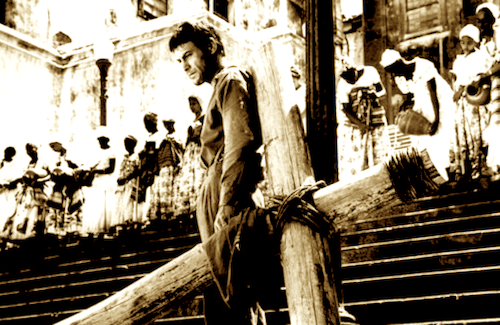O Pagador de Promessas
Written by Andreas Babiolakis
This review is a part of the Palme d’Or Project: a review of every single Palme d’Or winner at Cannes Film Festival. O Pagador de Promessas won the eighth Palme d’Or at the 1962 festival.
The film was selected by the following jury.
Jury President: Tetsurō Furukaki.
Vice President: Henry Deutschmeister.
Jury: Sophie Desmarets, Jean Dutourd, Mel Ferrer, Romain Gary, Jerry Kawalerowicz, Ernst Krüger, Yuli Raizman, Mario Soldati, François Truffaut.
I’m an absolute sucker for shorter films with one major blatant symbol that is tended to with near perfection of what is being said, how it is all presented, and how effective it is to see as a viewer. I’m talking about the titular donkey from Au Hasard Balthazar, the phone booth in the short The Telephone Box, and the crucifix at the centre of Anselmo Duarte’s Palme d’Or winning O Pagador de Promessas (otherwise known as either The Given Word or Keeper of Promises in English). I suppose I view these kinds of narratives as filmic fables of sorts. I also recall when I studied screenwriting in my undergrad that the notion of a strong symbol — usually an object or a specific being — in a screenplay can carry a story a long way. The example my class gave was the use of Captain Vidal’s pocket watch in Pan’s Labyrinth and how we instantly learn about the Falangist’s toxic constancy for order. Most well made films have an important symbol. The aforementioned films I stated earlier just happen to be defined by them.
Why that matters so much with O Pagador de Promessas is because it relies on this metaphor working. The lonely Zé has to help his best friend, who happens to be a donkey (perhaps a precursor to that Robert Bresson classic I mentioned earlier?) that is gravely ill. This very donkey may resemble the one that Jesus Christ rode into Jerusalem days before he was crucified, and that is how the story of Easter begins. It’s also how O Pagador de Promessas originates, but instead of the donkey representing a humble vessel for the face of a religion, it symbolizes a promise to do as has been done before. Zé vows to carry a cross to a church far away and give away all of his land if the donkey is saved. His prayers are answered, and he begins his pilgrimage with the crucifix on his back (again, like Jesus Christ when he was sent to his death).
The religious allegories of O Pagador de Promessas are used with much meaning and purpose.
Zé is not Jesus Christ, which is a given. He does resemble the holy figure’s self sacrifices and resilience in the faces of torment and abuse, though, particularly because a vast majority of O Pagador de Promessas’ runtime is devoted towards the response that Zé’s ritual draws, and the divide that follows behind him. The premise of the film is so simple, but it’s the effects from the cause that makes it a special experience, and a ride that feels far more uncontrollable than what you may have bargained for. Zé’s got something to prove only for himself, but his test of faith becomes a whole spectacle for the Brazilian citizens that encounter him from Nordeste to Salvador. What director Duarte pulls off with the constant chemical-societal reactions that surround Zé is quite astonishing and entirely believable; I’d like to pretend that this kind of uproar isn’t possible, but it sadly is likely quite feasible.
What exactly is O Pagador de Promessas saying? To me, it’s a comment on the bastardization of religious principles or doctrines: how the initial purposes of Christianity have been completely misunderstood and used for wrong. What is wrong? The numerous opinions that follow Zé all find their oppositions wrong and vice versa. This is all in the face of someone that is going through their own personal quest and is quite literally pushing themselves towards potential death. Is this what a martyr like Jesus Christ would look like in the age of modern civilization, where politics and agendas have run more rampant than ever? Quite possibly. Again, Zé himself isn’t posed as a messiah figure, but he certainly is practicing more of Christ’s philosophies than those that gawk at him.
O Pagador de Promessas takes its simple premise and runs with it to create a deep outlook on the state of personal beliefs.
A film like O Pagador de Promessas deserves to be talked about more often. It honestly has never come across my radar until I started doing this Palme d’Or project, and it is quite honestly a must-see slice of Brazilian cinema. It’s a testament that precise storytelling is all you need to get by. It’s as fundamental as a narrative can be whilst possessing tomes of ideas and discussions. If anything, the film is the foundation of must-have debates in the same way that many other thought provoking works are observed in Film 101 classes. I implore you to watch O Pagador de Promessas: a criminally cast-aside film that deserves to have a much larger legacy than being just a Palme d’Or winner (although that alone is a huge deal).
Andreas Babiolakis has a Masters degree in Film and Photography Preservation and Collections Management from Toronto Metropolitan University, as well as a Bachelors degree in Cinema Studies from York University. His favourite times of year are the Criterion Collection flash sales and the annual Toronto International Film Festival.








